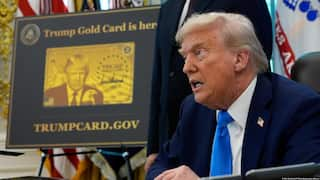Explorer
India offers biggest digital data opportunity

The Government of India, and lesser adjuncts such as the semi-government and private sector, are all rapidly going 100% digital for all critical path activities. It is changing over for everything: from global tendering, ordinary and 3D manufacturing, banking, administration, media, elections, law, defence, taxation, entertainment, and putting satellites in space.
The appetite on this sub-continent is in Exabytes per month. By 2021, Ericsson Mobility Report project 810 million smart phone users using over 50 Exabytes per annum composed of visual multi-media data, growing exponentially.
After the November 2016 demonetisation, and the push towards more digital transactions, Bill Gates, the world’s richest man for the 4th year running, quickly hailed India as the world’s biggest instant digital marketplace.
This was his reaction to just the handling of more of the money differently, but when you put the entire operation of the 1.2 billion population country on the cart, it is not only a technological challenge but a massive business opportunity.
And to meet the exponential growth in demand expected for almost everything that once took pen and paper, to be now processed on the cloud and internet, the big players are largely in the private sector.
Telecom market-leader for 15 years now, Bharti Airtel has just been pushed to second place by the mega merger of Idea with Vodafone. This has created a combined entity, ironing out the creases now, at Rs. 1.55 lakh crores.It is a behemoth bigger than AT&T, and second only to China Mobile globally.
Idea-Vodafone has a combined revenue market share of 41% ,with Bharti Airtel bringing up the second spot at 36.5% in revenues.
The public welcomed the advent of billionaire Mukesh Ambani’s JioInfocomm only a few months ago, (September 2016), with its offer of free voice and cheap data with a fast 4G service.
That was on the back of a Rs. 250,000 crore green-field investment from the cash-rich Reliance Group.
Jio Infocomm was similarly created when Reliance Infocomm merged with Malaysian owned Aircel. It hit the ground running, becoming thenation’s 4th largest telecom player.
Ambani saw the potential principally in digital data sales. Targeting the nationwide population of over a billion mobile/smart phone users JioInfocomm decided to design and offer “content” in 12 regional languages. It expects to meet all the dynamic and latent data demand in various Indian languages by 2018.
The billing for digital data is simultaneous with the surfing of the internet, and speed, of course is of the essence. In this, India lags behind many other countries despite its size and potential. But this lacuna will not stay long. Voice, on the other hand, by definition, only clocks revenue when two people or more have a conversation.
But universal upgradation to 4G speed, and a much faster 5G is now on the anvil, and new fibre optic cables are being laid furiously in city and countryside alike.
Ambani, at the top of India’s list of 101 billionaires and 33rd on the Forbes global list at $23.2 billion, is going to spare no expense or technical resource to capture pole position.
But then neither is Vodafone, struggling thus far with its Indian investment for a decade since 2007, when it bought out Hutchinson’s 67% stake to make an entry into India.
Or for that matter, Bharti Airtel, the only non-merged entity next to the top, hoping to take market share from both Idea-Vodafone and JioInfocomm as both iron out regulatory, operational, and commercial glitches arising from their respective mergers.
But as an outcome and benefit of both the enhanced investment and the competition between these and other players in the Indian market, the customer can look forward to better connectivity, service, pricing, and speed. Already, special offers and enhanced voice and data deals are rife.
The government is definitely the biggest single consumer, though individuals and corporations aggregated are nothing to sniff at.
Very soon, the advent of much faster speeds and data transmissioncombined with automation and the much greater use of various apps and bots will transform the way India communicates and usher in an efficiency revolution. Individuals and organisations will be empowered as they learn to access data and voice at their own pace without being stymied by human error or lethargy.
(Gautam Mukherjee is a blogger on politics, economics and policy. His twitter handle is @gautammuk)
Disclaimer: The opinions, beliefs and views expressed by the various authors and forum participants on this website are personal and do not reflect the opinions, beliefs and views of ABP News Network Pvt Ltd.
View More



























